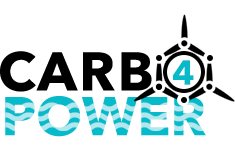Project Name: New generation of offshore turbine blades with intelligent architectures of hybrid, nano-enabled multi-materials via advanced manufacturing
Description
Carbo4Power is targeting to develop a new generation of lightweight, high strength, multifunctional, digitalised multi-materials for offshore wind and tidal turbine rotor blades that will increase their operational performance and durability while reducing the cost of energy production (below 10ct€/kWh for wind turbines and 15ct€/kWh for tidal), maintenance and their environmental impact. The innovative concept is based on nano-engineered hybrid (multi)materials and their intelligent architectures which breaks down as follows:
- Nanocomposites based on dynamic thermosets with inherent recyclability and repairability and tailored nano-reinforcements to enhance mechanical properties.
- Multifunctional nano-enabled coatings to improve turbine protection (e.g., against lightning and biofouling (e.g., 50% fouling release).
- Blade segments will be designed and fabricated by advanced net-shape automated multi-material composite technologies that will allow ca. 20% scrap reduction.
- The approach for WTB is to deliver an innovative design of modular rotor blade, while the approach for TTB is aimed towards an optimal design for ‘one-shot’ manufacture.
- Recycling of blade materials will be increased up to 95% due to the advanced functionalities of 3R resins and adhesives with debonding on demand properties.
The strategic goal is to provide the frame which will create new pathways for manufacturing of FRPs for multiple processing life cycles, and explore the emerging valorisation opportunities in the offshore energy sector.
The scope of Carbo4Power standardisation activities is to assess potential pathways for integrating results developed within Carbo4Power project into the existing standards landscape, as well as recommendations for new areas of standards activity in the offshore renewable energy sector. The term ‘standard’ refers to all types of documents published by formal Standards Development Organizations, irrespective of the level of consensus within the standardisation process, including both formal standards (e.g., EN, ISO, national standards) and other standardisation documents (e.g., TS, TR, CWA). Targeted working areas of standardisation include (but are not limited to):
- Paints and varnishes: Coating materials for offshore wind and tidal turbine rotor blades
- Circular economy: guidance for implementation in offshore energy sector, development of Product Disposal Specifications/Labeling for wind and tidal turbine rotor blades
- Nanotechnologies: nano-enhanced materials and composites for offshore renewable energy applications
- Non-destructive testing
Reason for applying to HSbooster.eu services
At the current stage of the project (M31), the most promising materials/technologies for offshore wind and tidal turbine rotor blades have been selected and an intermediate testing campaign is on-going that will be followed by manufacturing of offshore wind (downscaled) and tidal (full scale) turbine rotor blades demonstrators for testing in relevant environment (TRL6) by the end of the project. In this context, further interaction with standardisation professionals will be established during M31-M48 period, to provide insight and guidance (e.g., through a dedicated training workshop/session) on the compliance of the new materials, products and technical systems with the relevant standards (existing or under development), as well as on the identification of standardisation gaps and recommendations for new standards as a result of project activities.
A dedicated Task is included as part of the project implementation (Task 8.3: Liaison with regulation/standardisation bodies [Months: 1-48]’, aiming to establish a robust link among research, standardisation and innovation of Carbo4Power technologies. Under T8.3, continuous monitoring of standards under development in the abovementioned working areas is conducted, as groundwork for the interactions that will be established with relevant Technical Committee (TC) and Work Group (WG) members.
This interaction will be also supported by consortium members that are already involved in respective standardisation committees.
Through services offered by Standardisation Booster, the following aspects of Carbo4Power standardisation activities are expected to be strengthened, in terms of:
- Information on the standardisation landscape in the offshore renewable energy sector
- Interaction with standardisation professionals and engagement of relevant Technical Committee (TC) and Work Group (WG) members for guidance and recommendations
- Gain insight of processes and outcomes of standardisation
- Networking and clustering activities with other projects/stakeholders with common interests and applications scope, for the joint development of standards and exchange of best practices to overcome standardisation barriers.
Project Acronym: Carbo4Power

Grant Agreement Id: 953192
Start Date:
End Date:
Programme: H2020
Call for proposal: LC-NMBP-31-2020 - Materials for off shore energy (IA)
Funding Scheme: IA - Innovation action



